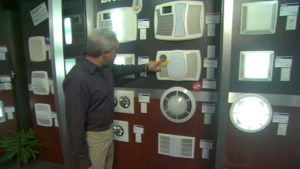It doesn’t matter whether you live in a tightly-sealed modern home or a leaky older home, having good ventilation systems is not a question. These systems not only improve the air quality in your house, they also remove stale odors and prevent health complications such as allergies and asthma. In a research done by the Environmental Protection Agency, indoor pollutant levels exceed those of outdoor by almost 2 to 5 times. Whenever contaminants such as gases and mold spores which come from carpets and furniture get trapped indoors, their concentration level rises with time and can reach potentially dangerous levels.
Exhaust fans such as those installed in kitchens and bathrooms help in pulling contaminated air from the indoor environment to the outdoor. This makes the indoor air easier and safer to breath. Before you install an exhaust fan, it is important you get in touch with a HVAC professional who will first assess the ventilation needs in your home and thereafter install an exhaust system where necessary.
Where to Install Exhaust Fans
As a rule of thumb, any room producing moisture will certainly benefit from an exhaust fan. The most critical rooms include laundry rooms, kitchens, and bathrooms. This is because the moisture coming from these rooms is enormous and removing it will help prevent or minimize the growth of mildew, mold, as well as protect materials that are sensitive to moisture in your home including metal fixtures and wallboards.
Installing kitchen fans such as range hoods can also help you to reduce the steam, smoke, and gases that are emitted during cooking. Range hoods have a unique advantage in that they capture the air directly as it comes from the cooking area and directs it outwards. Huge range hoods may need air supply from the outside so as to replace the air removed from the fans.
Other rooms you may consider include garages, workrooms, and craft rooms. There are exhaust fans that are capable of serving the entire house. These are normally tied with the AC and heat delivery systems.
Choosing an Exhaust Fan
The main parameters you should consider when choosing exhaust fans include the noise level and airflow. The airflow rating in these fans is measured in cubic feet per minute and the airflow required is normally based on the size of the specific room and how the fan is to be used. Bathrooms, kitchens, and garages have different airflow requirements. On the other hand, noise level is measured in metrics known as sones with one sone about as round as a refrigerator. Inline fans are the best because they have a remote motor and the operation is quieter.
Irrespective of the fan you choose, ensure it vents outside instead of the attic because mildew, mold, and other problems may go unnoticed.

